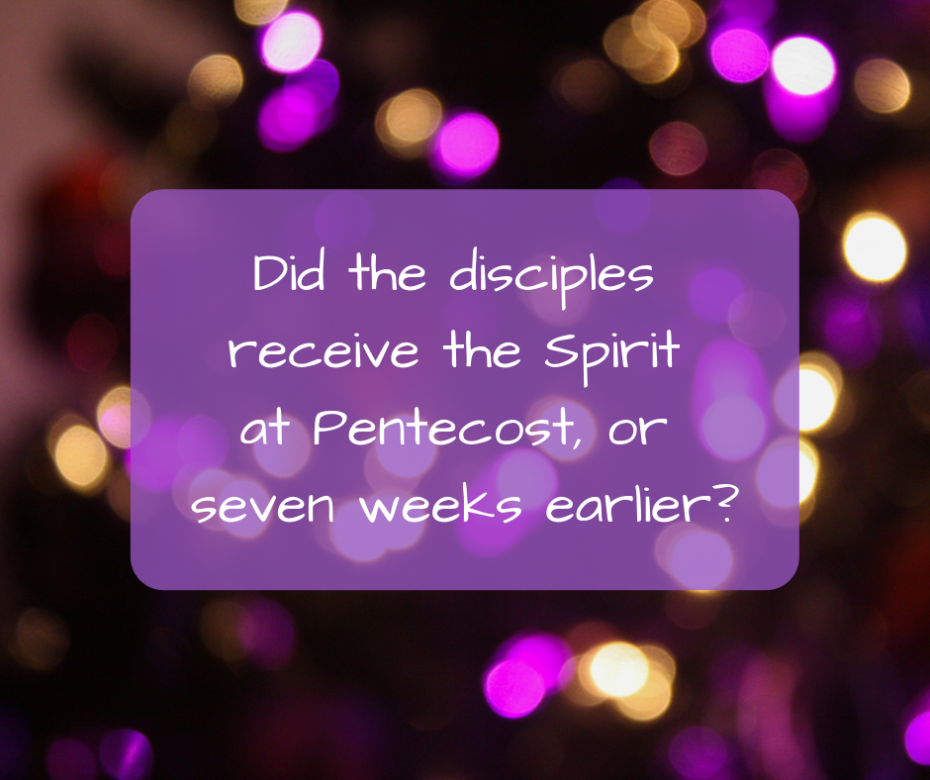A friend just sent in this super question:
I just finished listening to your podcast about repentance and baptism for the forgiveness of sins and had a question about when the disciples received the Holy Spirit.
I always thought the Holy Spirit was given to the disciples in John 20 when Jesus breathed on them in v. 22 and said, “Receive the Holy Spirit.”
In your podcast you said they didn’t receive the Holy Spirit until the Holy Spirit came upon them in the beginning of Acts.
How do you see the difference between the disciples receiving the Holy Spirit in John 20 and the Holy Spirit “coming upon” them and Acts 1 when they received power?
I always connected Acts 2 with 1 Cor 12:13 and the baptism of believers into the body of Christ, signifying the establishment of the church.
Starting with his last comment—yes, Acts 2 does tell of the baptism of the Holy Spirit (1 Cor 12:13). Peter and the other Apostles had already been born again. But only then were they baptized by the Holy Spirit. Remember that Jesus had said in the upper room, “the Spirit of truth…dwells with you and will be in you” (John 14:17, emphasis added). The Holy Spirit began permanently indwelling believers at Pentecost. That permanent indwelling is when believers are placed into (baptized into) the Body of Christ by the Spirit.
There is no question but that the Apostles received the Spirit at Pentecost. But did they also receive the Holy Spirit on the very day Jesus rose from the dead (John 20:22), seven weeks earlier?
The normal understanding of John 20:22 is that when Jesus breathed on the Eleven, He gave temporary enablement by means of the Holy Spirit. They did not gain permanent indwelling then. But they did get some special measure of the Spirit being with them.
I do not find that view convincing.
For one thing, the Apostles did not boldly go forth proclaiming the message of Christ at that time. In Acts when the disciples were filled with the Spirit, they proclaimed the word boldly (e.g., Acts 2:4; 4:8, 31). If they had received temporary enablement at the time of John 20:22, I think we’d see evidence of that recorded in the Gospels. But we do not.
For another thing, we know by the Lord’s own words that the time they would receive the Spirit would be after He ascended to heaven: “Nevertheless I tell you the truth. It is to your advantage that I go away; for if I do not go away, the Helper will not come to you; but if I depart, I will send Him to you” (John 16:7). That is clear.
Also, immediately before He ascended, the Lord Jesus said, “for John truly baptized with water, but you shall be baptized with the Holy Spirit not many days from now” (Acts 1:5). Compare that with Peter’s words in Acts 10:47, “Can anyone forbid water, that these should not be baptized who have received the Holy Spirit just as we have?” Or Peter’s words in Acts 15:8, “So God, who knows the heart, acknowledged them by giving them the Holy Spirit, just as He did to us.” Peter was talking about Pentecost (see Acts 2:33), not the day Jesus rose from the dead.
I hold to another interpretation.
Jesus could not breathe on the disciples after He ascended to heaven. So, if He wanted to do that, He’d do it before His ascension.
The word translated “He breathed” is emphusaō, which is related to the Hebrew word for breath or spirit (nephesh). Thus, there is likely a play on words here.
The words, “Receive the Holy Spirit” need not be understood to mean receive the Holy Spirit right now. These words could be proleptic, meaning “the representation or assumption of a future act or development as if presently existing or accomplished” (Merriam–Webster).
Say that your son was going to play in the Super Bowl in two weeks. But you have less than 24 hours to live. If, on your last night before death, you said, “Receive my blessing,” your son would know you were talking not about some blessing you were giving him that very moment, but your blessing for the game in two weeks. You need to say the blessing now because you’ll be in heaven when the Super Bowl is played.
I looked online and found an article (see here) which says that at least as early as the sixth century, John 20:22 was seen as proleptic. The article says that George Ladd held that view. While that is not the view of the author, he does show that it is a long-held view. (Some NT commentators suggest that John 20:22 refers to the time when the Eleven were born again. However, they were born again long before that, as a comparison of John 2:11 and John 3:16 shows.)
I also found another article, by Cornelis Bennema (see here), in which the author actually takes the view that John 20:22 is proleptic.


